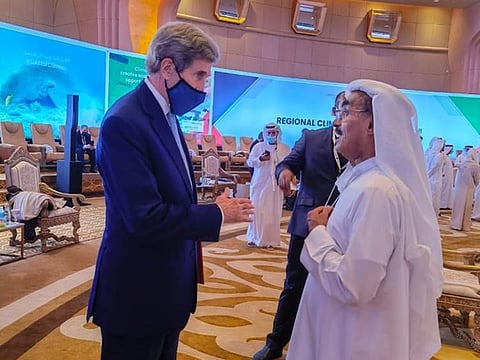UAE deploying innovating solutions to counter climate change, boost food security, says minister
Minister highlights strategic steps during ‘UAE Regional Climate Dialogue’ in Abu Dhabi

Also In This Package
Abu Dhabi: The UAE is bolstering its strategic position against climate change and food insecurity, the Minister of Climate Change and Environment told the first ‘UAE Regional Climate Dialogue’ on Sunday in Abu Dhabi.
Dr Abdullah Belhaif Al Nuaimi participated in the first such event, hosted by the UAE in the presence of John Kerry, US Special Presidential Envoy for Climate.
Dr Al Nuaimi spoke at the ‘Adapting to Climate Change’ session. The panellists, including Dr Yasmine Fouad, Minister of Environment of Egypt, exchanged experience in climate change adaptation with a focus on developing the agricultural sector and strengthening food security.
‘Impact likely to escalate’
In his opening statement, Dr Al Nuaimi said: “The impacts of climate change are already evident and are likely to escalate. Enhancing the adaptive capacity of communities, economies, and ecosystems is essential to protect the gains of growth, and pave the way for continued development. Adaptation action also yields valuable co-benefits for climate mitigation, and human health and welfare.”
He added: “Characterized by a desert climate, our region is especially vulnerable to climate impacts. True to our spirit of innovation, we in the UAE are taking strong steps to adapt to the risks posed by climate change, and we hope to share our experience with other countries.”
Adaptation efforts
Dr Al Nuaimi provided an overview of the UAE’s climate change adaptation efforts. He noted that the country has submitted its second Nationally Determined Contribution (NDC) that raises its climate ambitions, and covers climate change mitigation as well as adaptation.
Risks assessed in key sectors
He added: “The UAE National Climate Change Adaptation Programme aims to strengthen climate resilience. As part of the program, risks across four sectors – energy, infrastructure, health and environment – have been assessed, and sectoral adaptation action plans are being developed.”
Food security innovations
Speaking about food security – one of the country’s current priorities – Dr Al Nuaimi said: “The COVID-19 pandemic has highlighted the need for stable food supply chains and a reduction in export dependence. Despite climatic limitations, we are seeing promising developments in sustainable agriculture in the form of cutting-edge agri-tech and cultivation methods, such as hydroponic farming. Vertical farming projects in the UAE exhibit the potential to produce output equivalent to traditional farms 300 times their size. Maximising yields, optimising resource use, and reducing emissions, these practices address the critical water-energy-food nexus.”
Protecting nature and wildlife
He added: “Climate change adaptation goes hand in hand with environmental conservation. The National Biodiversity Strategy reflects the UAE’s commitment to protecting species and their habitats. The country has 49 protected areas that account for 15.5 per cent of its territory. We have also endorsed the global ‘30 by 30’ target for nature protection. To maximise the potential of nature-based climate solutions, we have pledged to plant 30 million mangroves by 2030. Mangroves protect our coasts from rising sea levels and storm surges, and are effective carbon sinks, capturing over one million tons of carbon dioxide in the UAE annually. Our efforts to conserve blue carbon ecosystems started five decades ago, and range from protection to restoration and expansion.”
Need for cooperation
In closing, Dr Al Nuaimi said: “The development of scalable and disruptive adaptation solutions calls for a multilateral effort. We must utilize existing global initiatives, such as Mission Innovation, as well as build new platforms for collective ideation. In the MENA region, we must work together to enhance the understanding of regional climate impacts and advance evidence-based adaptation. We look forward to the upcoming COP26 in Glasgow, and to the exchange of knowledge and practical collaborations that it will facilitate. As an ambitious and responsible nation, the UAE will continue to play an active role in building a climate-resilient future for all.”









